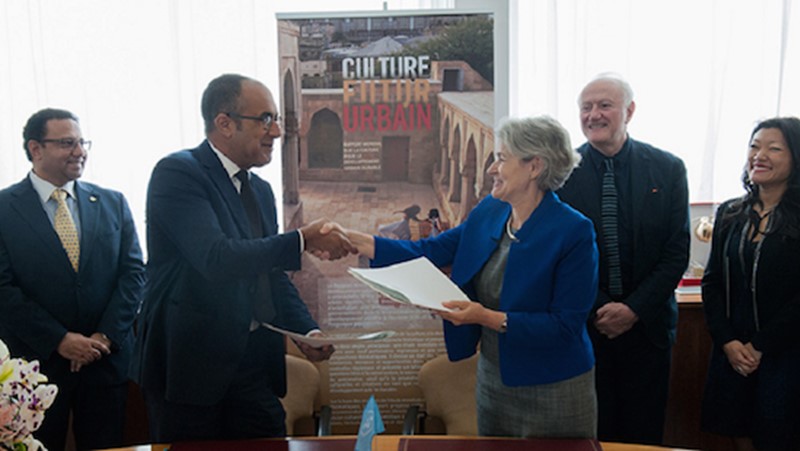
Paris, 12 November—The World Bank and UNESCO will highlight the essential role of culture in planning and funding projects for cities that have suffered the effects of war and disaster as they present a new policy paper, Culture in City Reconstruction and Recovery at UNESCO Headquarters on 16 November (5.30 pm).
Participants will include Mario Sander, Special Representative and Director for Europe, World Bank, Sameh Wahba,Director of Urban and Territorial Development, Disaster Risk Management, and Resilience, World Bank, Ernesto Ottone R., Assistant Director-General for Culture, UNESCO, alongside Toshiyuki Kono, President of International Council on Monuments and Sites, ICOMOS International, and Zaki Aslan, Regional Representative of the International Centre for the Study of the Preservation and Restoration of Cultural Property, ICCROM, for the Arab States, Director of the Regional Centre for Cultural Heritage Conservation in the Arab World (ICCROM-Sharjah), as well as the Permanent Delegate of Iraq to UNESCO, Mahmood Al-MullaKhalaf, and the Ambassador and Permanent Delegate of the State of Kuwait to UNESCO,Adam Al Mulla.
Culture in City Reconstruction and Recovery (CURE), a position paper, is to serve in planning policy and implementing projects for cities’ future processes of post-crisis (conflict and natural disasters) reconstruction and recovery processes. It recognizes that cities are cultural constructs whose creativity, traditions, landmarks and significant edifices are important to the social fabric of their populations. In this paper, both organizations acknowledge the importance of restoring cultural landmarks and supporting cultural expressions from the planning stage and throughout the implementation of urban regeneration projects, which need to reflect the needs and input of local communities and authorities.
Fast-growing urbanization around the world exposes cities and their inhabitants to the devastating effects of increasingly complex conflicts and ever more frequent natural disasters. By 2030, it is estimated that disasters will cost cities around the world some US$314 billion a year, nearly twice as much as the average over the previous 15 years. The approach outlined in CURE integrates culture into sustainable urban development policies to help build inclusive, safe, resilient, and sustainable urban environments for all.
CURE is part of a broader initiative following the signing of a Memorandum of Understanding between UNESCO and the World Bank in July 2017, which focused on urban regeneration and historic urban landscapes, the cultural and creative industries, as well as resilience and disaster risk management, with culture as a driver.
The two organizations are currently leading joint operational projects in Armenia, China, Georgia, Haiti, Mali, Pakistan, and Papua New Guinea. Both are preparing to collaborate on the rehabilitation of Mosul, Iraq, building on the CURE Framework, as part of the ‘Revive the Spirit of Mosul Initiative’ launched by UNESCO’s Director-General in February 2018 and the World Bank’s Emergency Operation for Development Project.


